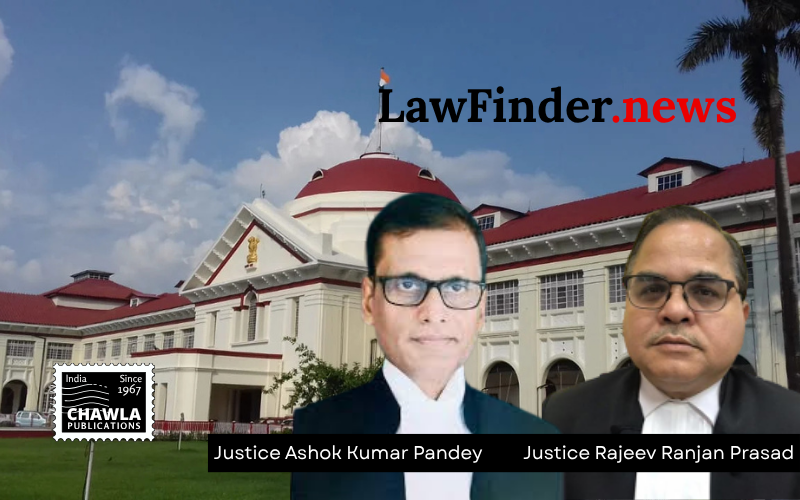Patna High Court Sets Aside Acquittal of Accused in 2003 Murder Case, Orders Fresh Trial. Court censures trial court for cut-and-paste judgment and improper appreciation of evidence, criticizes police investigation and record-keeping; directs speedy disposal within four months
In a significant judgment dated September 25, 2025, the Patna High Court (Division Bench comprising Justices Rajeev Ranjan Prasad and Ashok Kumar Pandey) allowed appeals filed by the State of Bihar and the informant against the acquittal of accused persons in a high-profile murder case dating back to 2003. The accused, including Sunil Yadav @ Kana and others, were earlier acquitted by the Additional Sessions Judge-III-cum-Special Judge MP/MLA, Patna, in Sessions Trial No. 246 of 2006 arising from Danapur P.S. Case No. 200 of 2003.
The case involved the murder of Satyanarayan Sinha, allegedly killed due to political and personal enmity near the house of Rambabu Pathik in Jamaluddin Chak, Patna. The prosecution's case was based largely on eyewitness testimony, including that of the informant, Asha Devi (wife of the deceased), and other injured witnesses who described a coordinated armed attack by the accused. Despite a detailed prosecution case supported by multiple witnesses and postmortem evidence confirming firearm injuries leading to death, the trial court acquitted the accused citing contradictions in witness testimony, lapses in police investigation, and lack of forensic corroboration.
Key Findings and Criticism by the High Court:
- 1. Cut-and-Paste Judgment: The High Court observed that the trial court’s judgment was a verbatim copy of the judgment delivered in a connected trial (Sessions Trial No. 246A of 2006), without independent appreciation of evidence specific to the present trial. The court pointed out that the trial court even mistakenly referred to the case number of the other trial in its judgment.
- 2. Improper Evidence Appreciation: The trial court was faulted for relying improperly on the evidence from another trial, despite an earlier order prohibiting such reference. The High Court emphasized that evidence in one trial cannot be used in another, even if the cases arise from the same First Information Report (FIR).
- 3. Investigation and Police Conduct: The High Court critically examined the conduct of the police investigation, noting serious lapses including delayed registration of FIRs, indifferent attitude of investigating officers, failure to send the vehicle and recovered materials for forensic examination, and non-examination of crucial police officers. The informant had also filed a protest petition alleging police collusion with the accused due to political influence, which was ignored by the trial court.
- 4. Contradictions and Witness Credibility: While the trial court gave undue weight to minor contradictions and lapses, the High Court reiterated well-settled legal principles that minor inconsistencies do not render the entire prosecution case unreliable. The court relied on Supreme Court precedents to emphasize that the principle "falsus in uno, falsus in omnibus" (false in one thing, false in everything) is not applicable in Indian criminal jurisprudence.
- 5. Non-Consideration of Key Documents: The trial court failed to take on record and properly consider critical documents such as the informant’s written information, protest petition, and certified copies of related FIRs, which could have shed light on the sequence of events and police conduct.
- 6. Misapplication of Section 319 CrPC: The trial court drew adverse inferences against the prosecution for not charging Rambabu Pathik, despite the legal provision allowing the court to summon additional persons if evidence showed their involvement.
- 7. Call for Preservation of Records: The High Court expressed serious concern over the poor maintenance of case records, many of which were found in torn and deteriorating condition, directing the Registrar General to digitize and preserve the records properly within two weeks.
Orders and Directions:
- - The impugned judgment of acquittal was set aside.
- - The matter was remanded to the trial court for a fresh trial and reappraisal of evidence uninfluenced by the High Court’s observations.
- - The trial court was directed to mark all relevant documents as exhibits and conduct the trial expeditiously, preferably within four months of receipt of records.
- - The accused were directed to surrender within two weeks and fresh bail bonds were to be obtained if on bail.
- - The High Court stressed the necessity of prompt and fair disposal given the long delay since the case’s inception in 2003.
Legal Provisions Involved:
Sections 148, 307, 302 of the Indian Penal Code (IPC), Section 27 of the Arms Act, and procedural provisions under the Code of Criminal Procedure (CrPC), including Section 319 CrPC.
This judgment underscores the High Court’s commitment to ensuring that justice is not defeated by procedural lacunae, police inefficiency, or judicial complacency, and reiterates the paramount importance of proper appreciation of evidence and adherence to legal procedures in criminal trials.
Statutory provision(s): IPC Sections 148, 307, 302, Arms Act Section 27, CrPC Section 319
State of Bihar v. Sunil Yadav @ Kana, (Patna)(DB) : Law Finder Doc Id # 2784278




